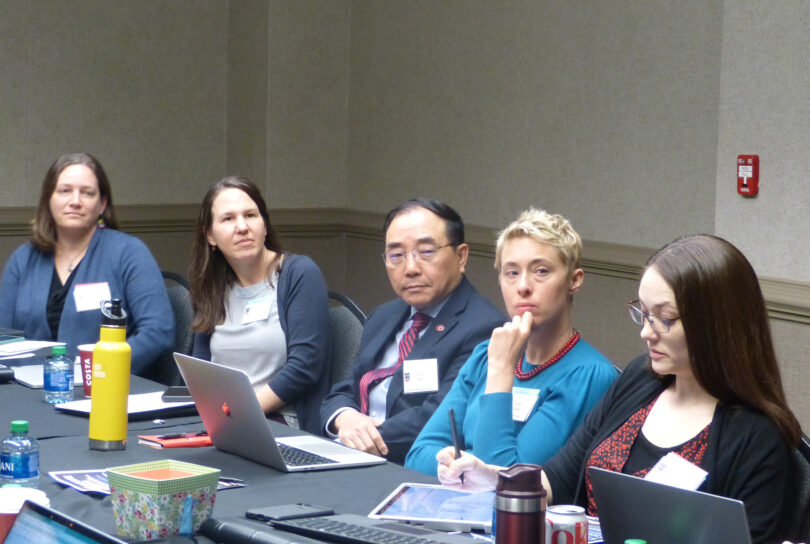With a focus on generative artificial intelligence in teaching and learning at the University of Georgia, the 33rd Academic Affairs Faculty Symposium brought together faculty members across campus to discuss the impact of AI on their fields and deliver recommendations to improve student experiences with AI-powered tools.
Sixty-three faculty members participated in the two-day event, Enhancing the Teaching and Learning Process with Artificial Intelligence, held March 24-25 at the Legacy Lodge on Lanier Islands.
Participants attended keynote, panel and discussion sessions.
Joe Broder, associate dean in the College of Agricultural and Environmental Sciences and chair of the executive committee of the UGA Teaching Academy, opened the symposium with the mission of the Teaching Academy and a review of some of the university initiatives that originated from past events.
S. Jack Hu, senior vice president for academic affairs and provost, led an opening session that highlighted the development of computing and adoption cycles of past disruptive technologies in education. He challenged the participants to continue to engage and plan.
“We have witnessed how computing changed education,” he said. “Now, how will predictive AI [based on text, code, images and sound] change teaching and learning?”
Megan Mittelstadt, director of the Center for Teaching and Learning, continued this theme in her keynote address. Mittelstadt shared data on how quickly products like ChatGPT are evolving and being adopted in the industries our students will enter.
During a fireside chat, UGA President Jere W. Morehead commended the impact of past symposia, encouraged participants to think broadly about strategic directions and answered questions from the faculty members.
The faculty participants joined one of five collaborative working groups to discuss specific benefits and challenges of generative AI within and beyond classrooms in undergraduate education, in graduate and professional programs, and in the administrative units that support instruction.
While developing their recommendations, these working groups considered cross-cutting themes of student learning outcomes, ethical use and academic honesty.
Participants also heard from several other senior administrators and campus leaders in AI. The speakers included Marisa Pagnattaro, vice president for instruction and senior vice provost for academic planning; Usha Rodrigues, then interim vice provost for academic affairs; Kimberly Van Orman, lecturer at the Institute for Artificial Intelligence; Aaron Schecter, an assistant professor in the department of management and information systems in the Terry College of Business; and Xiaoming Zhai, assistant professor in the department of mathematics, science and social studies education in the Mary Frances Early College of Education.
The final summative symposium report, submitted by the Teaching Academy executive board to the provost, included short-term and long-term recommendations from each breakout group on how the university can support faculty, staff and students in harnessing the potential of AI to enhance learning and career preparation.
The 2023 symposium planning committee was chaired by Broder with Gary Green, Sonia Hernandez, Mark Huber, Melissa Landers-Potts, John Mativo, Michele Matthews, Mittelstadt, Naomi Norman and Rodrigues.
Breakout groups were facilitated by Suzanne Graham, Huber, Landers-Potts, Rodrigues and Bill Vencill.
The Ecotones, a UGA student a cappella group, provided evening entertainment.
The Academic Affairs Faculty Symposium is sponsored by the UGA Teaching Academy with support from the Office of the President and funding from the Office of the Senior Vice President for Academic Affairs and Provost, the College of Agricultural and Environmental Sciences and the Louise McBee Institute of Higher Education.








